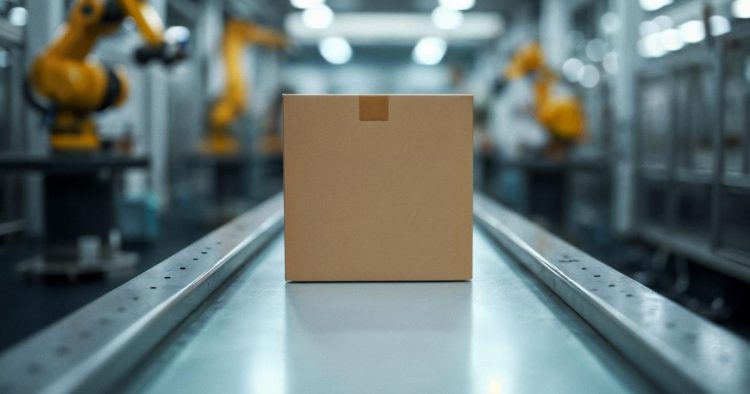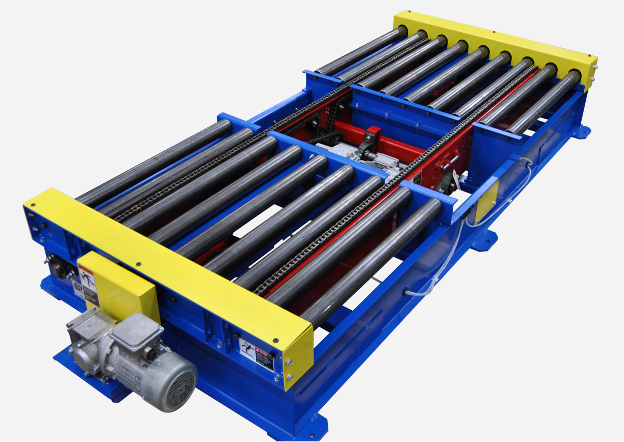
Downtime doesn’t just delay your schedule; it cuts into your profit. Whether you’re running a packaging line, managing materials in an automotive parts facility, or optimizing warehouse logistics, conveyor performance plays a major role in keeping production on track. And when a conveyor system fails, every minute you wait on a fix costs you.
That’s why more manufacturers across Canada are rethinking how they source their equipment. When it comes to conveyors, local sourcing is a smart move. From quicker lead times to stronger safety compliance, Canadian-made conveyor systems give you an edge.
We’ve seen how local supply chains help reduce risk, speed up support, and add long-term value for all kinds of operations. The real question isn’t whether you can afford to go local, but whether you can afford not to. Smart buying teams are looking beyond the initial quote and seeing the full picture.
Here’s a tough truth: the cheapest quote in your inbox might cost you the most. Once you factor in delays, compliance work, and unplanned downtime, that “deal” can turn into a headache fast.
Local Lead Times are Shorter and That’s a Competitive Advantage
Let’s talk logistics. A component failure occurs. You need a replacement part, and timing matters. Production delays affect schedules, crew coordination, and output targets. The faster you can resolve equipment issues, the better your operation runs.
When you work with a Canadian conveyor manufacturer, coordination becomes more straightforward. Local project management means direct communication, streamlined processes, and no time zone barriers when you need support. You’re dealing with teams who understand your operational pressures and can respond accordingly.
And it’s not just delivery. Local partners can coordinate site visits, design changes, or install assistance without the time zone dance. If something’s not working on site, you’re more likely to have a technician available to troubleshoot in person rather than navigate long-distance service support. That agility can mean the difference between hours of downtime and days.
Canadian manufacturers also keep a pulse on common industry failures. That means you’re getting systems designed for real-world conditions seen in Canadian facilities. Research shows how easily international supply chains can break down, something many learned the hard way during recent disruptions.
Pro tip: Build lead time comparisons into your buying process. Consider not just the delivery of the conveyor system itself, but also how quickly you’ll get support when things inevitably need service.
Built for Canadian Safety Standards and Plant Environments
You shouldn’t need to modify your conveyor system just to pass inspection. With Canadian-made equipment, you’re starting ahead. Local manufacturers build to meet national safety regulations, including CSA standards, provincial OHSA guidelines.
Offshore systems may look the same on paper, but they often need expensive changes to meet Canadian rules. From guarding protocols to material finish, local suppliers already know the specs. The Canadian Centre for Occupational Health and Safety provides the guidelines that Canadian manufacturers build into their systems from day one—not as an afterthought.
Consider what happens when imported equipment doesn’t meet provincial safety requirements. You might discover that conveyor guards need replacement, electrical components require CSA-approved alternatives, or emergency stops need complete redesign. These retrofits add weeks to installation timelines and thousands to project budgets.
Takeaway? You reduce risk during inspection, save on compliance retrofits, and get systems that run reliably year-round in Canadian conditions.
Better Customization Through Real Collaboration

Standard solutions work for standard problems. But let’s be honest—your facility probably isn’t standard. Plant layouts vary, production demands shift, and integration challenges pop up that no textbook covers. That’s where Canadian suppliers shine: they can actually show up.
Face-to-face consultation makes a difference when you’re designing complex systems. A Canadian supplier can walk your floor, see how operators interact with existing equipment, and spot space constraints that don’t show up in CAD drawings. They understand regional compliance quirks, seasonal temperature swings, and the specific challenges that come with Canadian operations.
This proximity translates into better solutions. Automotive parts facilities get conveyors designed for just-in-time production demands and precision handling requirements. Warehousing operations get systems built for high-volume throughput and flexible routing capabilities.
Automation integrators get conveyors that seamlessly connect with robotic systems and control networks. Canadian Fabricating & Welding regularly features examples of how domestic manufacturers adapt designs to meet unique operational needs.
The design process moves faster, too. Prototype testing, modification discussions, and approval cycles happen in days, not weeks. You make decisions based on actual equipment evaluation rather than theoretical specs and overseas video conferences.
Canadian manufacturers also understand material selection for local conditions. They know which steel grades perform best in specific environments, how different bearing configurations affect maintenance schedules, and which drive systems deliver optimal efficiency for applications. This knowledge results in conveyor systems that perform better and last longer in real-world Canadian conditions.
One example: a Canadian ceramic manufacturer needed a conveyor system that could reliably move delicate ceramic bats through a high-heat treatment and cooling process with minimal manual input.
Rolmaster designed a 1,000-foot line shaft system with pop-up transfers, custom loading, and sensor-based traffic control. Built for continuous, lights-out production, the system delivered high uptime with low maintenance. This is exactly the kind of custom solution that’s hard to get from offshore suppliers. View the full case study
Pro tip: When evaluating suppliers, ask for specific examples of recent customizations. Can they modify drive configurations for your application? Do they stock critical replacement parts locally? How do they handle emergency service during your peak production periods?
The Real Cost Comparison: Total Ownership vs. Purchase Price
Upfront price tags grab attention, but they don’t tell the whole story. When it comes to conveyors, the real cost shows up in how a system performs, how often it breaks down, and how easy it is to keep running. Canadian-made conveyors often win out here, not because they’re the cheapest, but because they’re the most dependable over time.
Think about the hidden costs that come with offshore systems. Shipping delays turn simple part replacements into production stoppages. Warranty claims require international coordination. And when support is based in another time zone, troubleshooting can drag on for days. All of that adds up fast.
Local suppliers avoid those issues. If a component needs replacing, it ships from within Canada. If a repair is urgent, a technician can be on-site within hours, not days. And because Canadian manufacturers build to last, you’re less likely to run into these issues in the first place.
Upfront price tags grab attention, but they don’t tell the whole story. When it comes to conveyors, the real cost shows up in how a system performs, how often it breaks down, and how easy it is to keep running. Canadian-made conveyors often win out here, not because they’re the cheapest, but because they’re the most dependable over time.
Think about the hidden costs that come with offshore systems. Shipping delays turn simple part replacements into production stoppages. Warranty claims require international coordination. And when support is based in another time zone, troubleshooting can drag on for days. All of that adds up fast.
Local suppliers avoid those issues. Canadian manufacturers build to last, reducing the likelihood of unexpected breakdowns. When you do need support, you’re dealing with suppliers who understand your market, your timeline pressures, and your operational requirements.
Smart Supplier Evaluation: Beyond Price Sheets
Smart buying teams evaluate suppliers on the whole, not just on price. Look for suppliers with proven experience in your industry and compare their technical capabilities and delivery commitments. Ask for customer references from similar operations in your region and verify performance against promised specifications.
Strong finances matter for long-term partnerships. Canadian suppliers with proven track records and strong balance sheets provide better assurance for multi-year relationships. You want partners who’ll support your equipment throughout its lifecycle, not suppliers who might disappear during economic downturns.
Look for suppliers who understand your industry’s specific challenges. A conveyor manufacturer serving automotive parts facilities should understand just-in-time delivery pressures. This expertise shows up in design details that generic manufacturers miss.
Making the Strategic Choice for Long-Term Success
Sourcing Canadian-made conveyors isn’t about patriotism—it’s about operational excellence. When you factor in faster response times, built-in compliance, collaborative customization, and superior long-term value, Canadian suppliers offer advantages that smart buying teams increasingly recognize.
The manufacturing landscape keeps evolving toward more responsive, flexible operations. Recent supply chain disruptions highlighted the risks of overseas dependencies, while automation demands require closer supplier partnerships and faster implementation timelines. Canadian conveyor manufacturers are positioned to support these changing requirements through proximity, expertise, and collaborative relationships.
Global uncertainties aren’t going away. Energy costs, shipping delays, and trade disputes continue affecting international supply chains. Local suppliers provide stability and predictability that offshore alternatives simply can’t match.
Your next conveyor buying decision is an opportunity to reassess sourcing strategies and prioritize operational performance over simple price comparisons. Canadian suppliers offer strategic advantages that deliver measurable value throughout equipment lifecycles—advantages that become more valuable as your operations grow and evolve.
Ready to explore how Canadian-made conveyor solutions can strengthen your operations? Connect with our team to discuss your specific requirements and discover why 75+ years of Canadian manufacturing expertise makes the difference between a conveyor purchase and a strategic partnership that drives long-term success.

